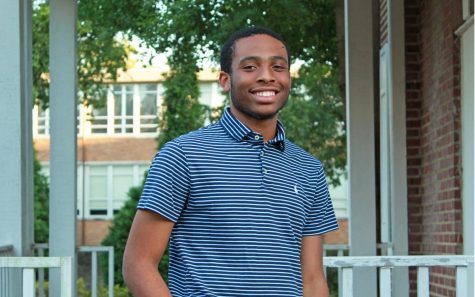Thomas: Sleep Deprivation at MSMS
Sleep deprivation has become a tradition here at MSMS.
October 9, 2018
If you are one of those people who believe that there is no chance of a zombie apocalypse, try taking all of the available coffee away from MSMS students, and watch them as they morph into lifeless beings.
Deprived from many hours of much needed sleep, MSMS students still seem to manage all of their rigorous coursework, work service, wellness hours and extracurricular activities.
When the class of 2020 arrived, seniors warned us about the exponential decrease in hours of sleep, but I ignorantly failed to believe them. Then, the third full week of school hit me with two tests, four quizzes, and almost no sleep; it has not gotten any better since.
I’ve come to the realization that not getting sleep is the nature of a typical MSMS students–like we picked up that burden along with our scroll and puzzle piece at the Ceremony of Lights.
It is so common that we often sit and laugh about it to avoid rubbing our eyes and yawning. Ironically, we use our struggles as methods of bonding.
Why don’t MSMS students get sleep?
According to our wonderful instructors, we don’t get sleep because we wait too late do our assignments. I agree that procrastination is too heavily practiced here at MSMS; however, I do not believe it is the only reason that students are sleep deprived.
First of all, a lot of students feel the need to be active in the school’s clubs and organizations. This is the way most students, including myself, escape the onerous academic environment and actually get to do something for leisure. In fact, this is highly encouraged by the staff, but as the old saying goes, “too much of a good thing can be a bad thing.”
Because of all the club meetings, it can be difficult to get homework and studying done during the day which forces students to have to wait until study hours. Speaking of study hours, students who need help spend 90 minutes at tutorials. This means that they’re spending 75% of their time focusing on one or two classes at a time when they have homework for five.
All of this results in students having to start on work after or close to the end of study hours. You plan to finish by 11:30 p.m., but you don’t finish until 3 a.m. because time always seems to fly when you need it to slow down.
What are the negative effects of sleep deprivation?
Unsurprisingly, there are plenty of problems with not getting enough sleep. According to Forbes.com, one of the central functions of sleep is to solidify memory; therefore, a loss of necessary hours of sleep can make it very hard to remember those solubility rules you crammed in your head for the quiz the next day.
If you’re up late at night and the weight of the world is pulling down on your eyelids while doing work, you’re most likely not producing quality work. There is nowhere near enough time in class to understand all of the information that is presented to us. With that being said, teachers give a lot of homework for us to better understand what is being taught. If we don’t really pay attention to what we’re doing on the homework, we will not obtain all of the information necessary for our success.
According to National Institutes of Health, sleep deprivation can lead to microsleeps, which are very brief episodes of sleep while being awake. MSMS students are very familiar with this concept because of the constant battle between the temptation to take a nap in their English class and the need to listen to what is being said so that they can pass the next quiz.
Additionally, studies have shown that the lack of sleep causes the body to have poor control over glucose distribution. It could cause drastic weight loss or even weight gain. This means all those hard earned wellness hours could be just wasted.
How do MSMS students function on such little sleep?
Since the majority of the students here seldom go to sleep before 12 a.m., one would wonder how we manage to function like normal human beings. Different students have different strategies.
Some people inundate their bodies with gallons of coffee hoping that the caffeine will give them the durability to make it through the day just to stay up late again that night. Others will just take a nap between classes.
Most have a series of alarms strategically set in intervals to ensure that they won’t be late to class. Apparently, a few unfortunate students didn’t get that message because they’ve been punished after receiving a succession of tardies.
Some students have psychology on their side. According to a study by the Human Sciences Department at Loughborough University, divergent thinking (outside of the box thinking) is heavily dependent on sleep, but convergent thinking (i.e. figuring out answers for standardized tests) is not. It is enough to survive through a typical day at MSMS, but it’s not going to be helpful for Mu Alpha Theta meetings.
However, a small group of people do get sleep, but they fall into certain categories. Some actually are proactive and have their lives together. Then, there are those students who just accept the failure and go to sleep regardless of how much homework or studying they have to do. This is what we MSMS students call “taking an L”.
Is it possible to get a proper amount of sleep and have good grades?
This is a question I often ask myself. So far, I don’t think it is completely possible. I have times where I am ahead on all of my work, but as soon I blink, a stack of more work spontaneously appears before me.
It’s almost like you have to choose your battles here at MSMS. Since I have chosen to get good grades, I sacrifice a couple hours of sleep. It is obviously more detrimental than helpful due to the pair of tardies that I have under my belt.
MSMS teachers will tell you in one breath to not procrastinate and to have fun while you can. It is extremely counterintuitive to say such things while distributing piles of homework due the next class meeting.
***
Many would say the Mississippi School for Mathematics is wonderful place, but its inhabitants have some not-so-wonderful habits. However, sleep deprivation is not something that should be considered a “habit” here. It is merely a way of life.










Camelia Woods • Nov 8, 2018 at 6:24 pm
When I saw the first sentence in the preview on Facebook, I knew this article was going to be entertaining. You came in swinging and never stopped. THIS is what I call writing. It had my full attention from beginning to end. I’ve been reading articles on the vision because I know this is where I can find good young writers, but this one was worth my comment. Great Job!
Aaliyah Zion • Nov 1, 2018 at 6:49 pm
I can honestly say that I am not a big fan of reading at all, but I had so much fun reading this article. Your writing style is well beyond your age. You gave facts without boring me, and you used comedy without going too far. Do I smell next year’s lead editor? I will most definitely be reading more of your work. Great job young man!
Cenella Grant • Oct 30, 2018 at 9:58 am
Thank you so much for this article!! I’m not in college, but I have a friend who needed to read this to see how the lack of sleep (and too much coffee) can have an adverse effect on the mind and body.
Elaine Cannon • Oct 11, 2018 at 5:17 pm
Yes indeed I admire students like you. And I know U will become a great editor…. Keep up the good work!
Monica Beeman • Oct 11, 2018 at 11:52 am
Cameron! You know I’m proud of you don’t you? I’m going to miss you dearly this year being in 4-H. You were a great student and looks like you’re an AWESOME student there at MSMS. I’m so glad you stepped outside!
Gail Sherman • Oct 10, 2018 at 10:56 pm
Look back at where you came from and let yourself feel PROUD about your progress.
YOU ARE KILLING IT!!
I am proud of you Cameron! Keep up the awesome job!
JaDorra • Oct 10, 2018 at 10:47 pm
We, the students of MSA, feel your pain. This is simply preparing us for college. People like to pretend that college is all fun and games ,and at the end of the year you get a degree. This is all false! College is some sleepless nights, some thesis statements due before 11:59, some exams that you are barely prepared for because you didnt read your syllabus. I actually appreciate these schools for making us at least 80% prepared for college.